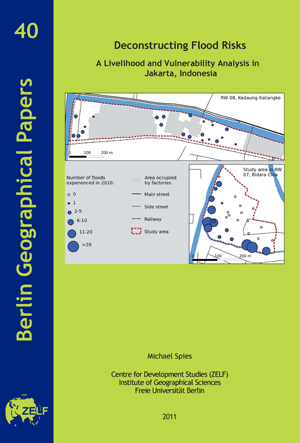
Zitationsvorschlag
Lizenz

Dieses Werk steht unter der Lizenz Creative Commons Namensnennung - Weitergabe unter gleichen Bedingungen 4.0 International.
Veröffentlicht
Downloads
Deconstructing Flood Risks
A Livelihood and Vulnerability Analysis in Jakarta, Indonesia
“Flooding is the least of the problems, it is a usual thing.”
“We are not afraid of floods, we are used to them.”
— Interviewees in East Jakarta, December 2010
Statements like the above were given by several residents in neighbourhoods of Jakarta that are often described as being “most vulnerable” to flood hazards. (...) Is it possible that such disasters are just a minor issue for the supposedly most affected? Or are the above statements the result of subconsciously repressed disaster memories, or some kind of fatalism?
In Jakarta, several community-based projects on flood risk reduction emerged in recent years. These projects can be interpreted as responses to the growing emphasis on bottomup, community-based approaches in the international research and policy community on disaster risk reduction. Organisations such as MerciCorps and UNESCO implemented projects that aim to strengthen local capacities of flood risk reduction in Jakarta’s most affected neighbourhoods. Typical project measures are awareness campaigns on solid waste issues, the strengthening of local disaster management and small-scale, physical measures of flood mitigation.
However, considering the introductory quotes above, the legitimacy of these projects — or at least of its labelling as “community-based” and “bottom-up” — comes into question. If flooding is not seen as a problem in Jakarta’s most affected neighbourhoods, these projects appear to miss the point. In other geographical contexts, scholars criticised that humanitarian organisations look through a “disaster lens” in their community assessments and tend to neglect local risk priorities when implementing community-based projects.
Thus, the aim of this paper is to find out what is behind the apparently low priority of flood risk for the supposedly most affected people — an underrated issue in the research literature on flood or disaster risk reduction. The overall research question is therefore: Is flooding a minor problem for the most affected households in Jakarta?








